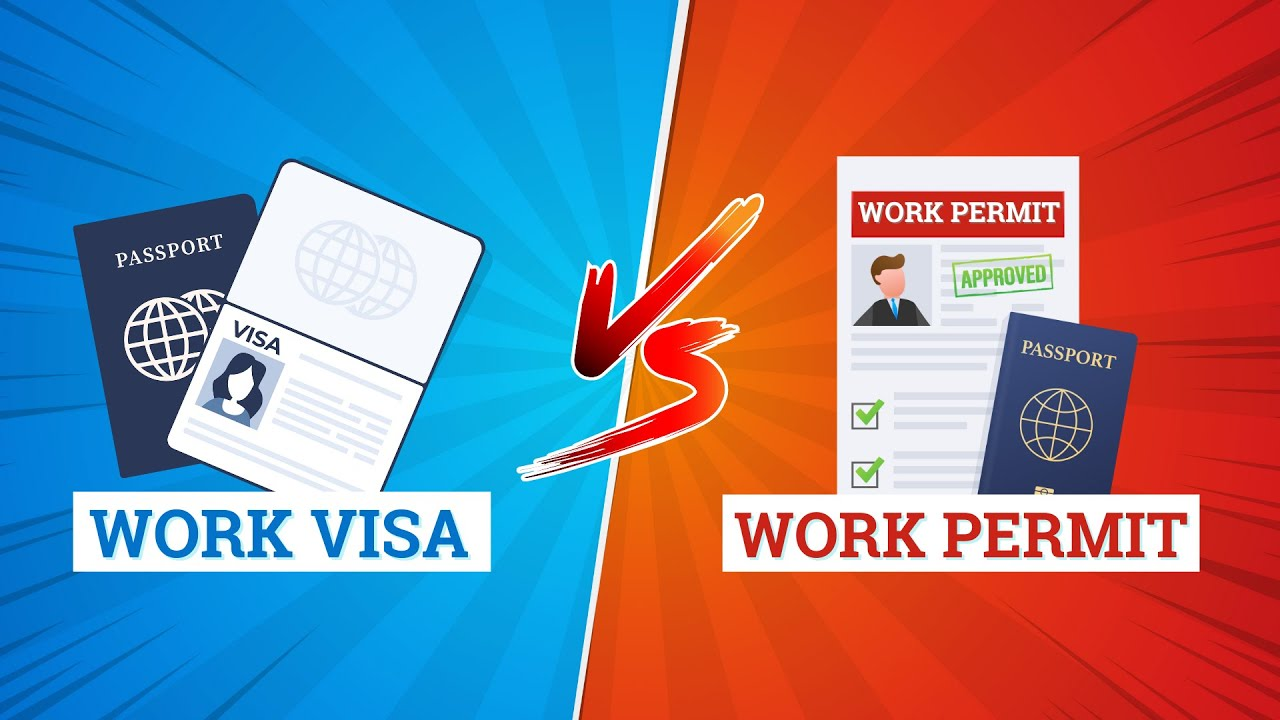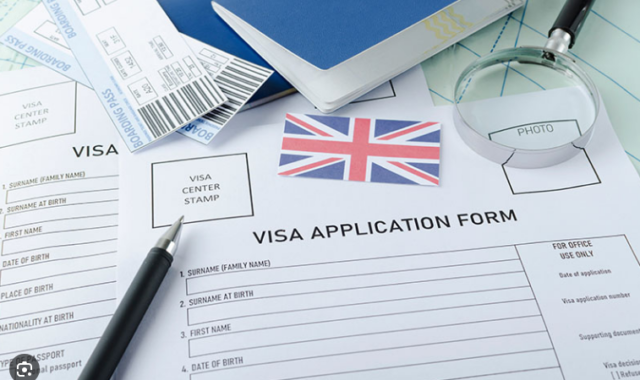Das Vereinigte Königreich ist mit seinem dynamischen Arbeitsmarkt und seinen vielfältigen Möglichkeiten seit langem ein attraktives Ziel für Fachkräfte aus der ganzen Welt. Für diejenigen, die in England leben und arbeiten möchten, bietet das Einwanderungssystem mehrere Möglichkeiten, darunter Arbeitsgenehmigungen und Arbeitsvisa.
Während die Begriffe "Arbeitserlaubnis"Arbeitsvisum" und "Arbeitsvisum" werden oft synonym verwendet, sind aber nicht identisch. Für Personen, die zu Beschäftigungszwecken in das Vereinigte Königreich ziehen möchten, ist es wichtig, die Unterschiede zwischen den beiden Begriffen zu kennen.
In diesem Artikel werden die wichtigsten Unterschiede zwischen einer Arbeitserlaubnis für England und einem Arbeitsvisum erläutert und die jeweiligen Anforderungen, Vorteile und Verfahren erklärt.
Sind Sie bereit, Ihr Visum für das Vereinigte Königreich zu beantragen?
Klicken Sie auf die Schaltfläche unten, um Ihren einfachen und sicheren Visumantrag zu starten.
🇬🇧 HIER EIN VISUM FÜR DAS VEREINIGTE KÖNIGREICH BEANTRAGENWas ist eine Arbeitsgenehmigung in England?
Eine Arbeitserlaubnis im Vereinigten Königreich ist eine offizielle Genehmigung für ausländische Staatsangehörige, im Land für einen bestimmten Arbeitgeber zu arbeiten. Früher war die Arbeitserlaubnis ein separates Dokument, das von der britischen Regierung ausgestellt wurde und es Ausländern ermöglichte, im Vereinigten Königreich eine Beschäftigung aufzunehmen. Das System hat sich jedoch weiterentwickelt, und die Arbeitserlaubnis wird heute größtenteils durch das Facharbeitervisum ersetzt, das sowohl als Arbeitserlaubnis als auch als Einwanderungsdokument dient.
Eine Arbeitserlaubnis ist im Wesentlichen eine Erlaubnis für Personen, die in das Vereinigte Königreich einreisen und dort arbeiten möchten. Das moderne Äquivalent des Arbeitserlaubnissystems ist das Facharbeitervisum, das nach dem punktebasierten Einwanderungssystem des Vereinigten Königreichs funktioniert. Um sich für dieses Visum zu qualifizieren, müssen die Antragsteller bestimmte Kriterien erfüllen, z. B. ein Stellenangebot eines lizenzierten Sponsors, ein bestimmtes Gehaltsniveau und ein anerkanntes Qualifikationsniveau für die angebotene Stelle.
Was ist ein Arbeitsvisum in England?
A Arbeitsvisum, ist dagegen ein weiter gefasster Begriff, der sich auf jedes Visum bezieht, das zum Zweck der Arbeit ausgestellt wird, einschließlich, aber nicht beschränkt auf das Facharbeitervisum. Ein Arbeitsvisum ist im Wesentlichen ein Oberbegriff, der alle Arten von Visa umfasst, die Personen erteilt werden, die im Vereinigten Königreich arbeiten wollen. Dazu gehören auch spezielle Visa für hochqualifizierte Arbeitskräfte, Zeitarbeiter und andere spezifische Kategorien von Arbeitnehmern.
Das Facharbeitervisum ist die häufigste Form eines Arbeitsvisums im Vereinigten Königreich. Es gibt jedoch mehrere andere Kategorien von Arbeitsvisa, darunter:
- Visum für Beschäftigte im Gesundheits- und Pflegebereich: Ein spezielles Visum für Fachkräfte des Gesundheits- und Pflegesektors, das es ihnen ermöglicht, im britischen Gesundheitssektor zu arbeiten.
- Global Talent Visa: Für hochqualifizierte Fachkräfte in Bereichen wie Technologie, Wissenschaft, Medizin und Kunst.
- Visum für befristet Beschäftigte: Für Personen, die eine kurzfristige Tätigkeit ausüben, wie z. B. Mitarbeiter von Wohltätigkeitsorganisationen oder Kreativprofis.
- Visum für den unternehmensinternen Transfer: Für Mitarbeiter multinationaler Unternehmen, die in eine britische Niederlassung versetzt werden.
Die wichtigsten Unterscheidung zwischen Der Unterschied zwischen einer Arbeitserlaubnis und einem Arbeitsvisum besteht darin, dass sich eine Arbeitserlaubnis in der Regel auf eine Beschäftigungsgenehmigung im Rahmen eines bestimmten Programms (wie das Facharbeitervisum) bezieht, während ein Arbeitsvisum eine Reihe von Genehmigungen für die Arbeit im Vereinigten Königreich umfasst.
Hauptunterschiede zwischen Arbeitsgenehmigungen und Arbeitsvisa
Obwohl die Unterscheidung zwischen einer Arbeitserlaubnis und Arbeitsvisum in der modernen Einwanderungspolitik des Vereinigten Königreichs etwas verwischt ist, bleiben einige wesentliche Unterschiede bestehen. Der folgende Vergleich soll helfen, ihre Rolle im britischen Einwanderungssystem zu klären.
1. Terminologie und Entwicklung
Wie bereits erwähnt, hat sich das Konzept der Arbeitserlaubnis im Laufe der Zeit weiterentwickelt. Früher war die Arbeitserlaubnis ein eigenständiges Dokument, das von der Regierung ausgestellt wurde und es ausländischen Staatsangehörigen ermöglichte, für einen bestimmten Arbeitgeber zu arbeiten. Im Laufe der Jahre ging das Einwanderungssystem des Vereinigten Königreichs zu einer umfassenderen Struktur von Arbeitsvisa über, die die Arbeitserlaubnis unter dem Dach der Visa einschließt.
Derzeit ist der Begriff Arbeitserlaubnis weitgehend ein Relikt des alten Einwanderungssystems, das jetzt durch das Facharbeitervisum ersetzt wird. Im Gegensatz dazu bezieht sich ein Arbeitsvisum auf jedes Visum, das zum Zweck der Beschäftigung im Vereinigten Königreich ausgestellt wird, und es umfasst verschiedene Kategorien von arbeitsbezogenen Visa.
2. Arten von Visa vs. Erlaubnis
Während sich der Begriff "Arbeitserlaubnis" im Allgemeinen auf einen bestimmten Weg zur Beschäftigung bezieht, ist ein Arbeitsvisum ein Oberbegriff, der mehrere Arten von beschäftigungsbezogenen Einwanderungskategorien umfasst. Ein Arbeitsvisum umfasst alle arbeitsbezogenen Anträge, wie z. B. das Facharbeitervisum, das Gesundheits- und Pflegearbeitervisum, das Global Talent Visa und das Temporary Worker Visa.
Im Gegensatz dazu bezieht sich der Begriff "Arbeitserlaubnis" in der Regel auf Personen, die sich unter bestimmten Beschäftigungsbedingungen bewerben, für die eine Bescheinigung eines britischen Arbeitgebers erforderlich ist, insbesondere für qualifizierte Tätigkeiten. Daher ist der Rahmen für Arbeitsvisa flexibler und kann eine Vielzahl von Fachkräften aus unterschiedlichen Branchen und Qualifikationsstufen aufnehmen.
3. Anspruchsberechtigung und Anforderungen
Sowohl für Arbeitsgenehmigungen als auch für Arbeitsvisa müssen die Antragsteller bestimmte Voraussetzungen erfüllen. Die spezifischen Kriterien variieren jedoch je nach Visumkategorie.
- Arbeitsgenehmigung: In der Vergangenheit konzentrierte sich der Anspruch auf eine Arbeitserlaubnis darauf, ein Stellenangebot von einem zugelassenen britischen Arbeitgeber zu erhalten. Die Arbeitgeber waren für das Sponsoring ausländischer Arbeitskräfte verantwortlich und mussten sicherstellen, dass diese bestimmte Qualifikations- und Gehaltsanforderungen erfüllten. Heute gelten für das Facharbeitervisum ähnliche Anforderungen, wie z. B.:
-
Ein Jobangebot von einem anerkannten Sponsor.
-
Die Tätigkeit muss in der Liste der förderfähigen Berufe aufgeführt sein.
-
Die Mindestlohnschwelle, in der Regel 26.200 £ pro Jahr oder 10,75 £ pro Stunde.
-
Nachweis von Englischkenntnissen.
-
Nachweis ausreichender finanzieller Mittel (falls nicht vom Arbeitgeber bereitgestellt).
-
- Arbeitsvisum: Die Voraussetzungen für ein Arbeitsvisum variieren je nach Art des Visums. Für ein Global Talent Visa können zum Beispiel unterschiedliche Kriterien gelten, wie z. B:
-
-
Nachweis der Anerkennung als führende oder aufstrebende Persönlichkeit in einem bestimmten Bereich.
-
Befürwortung durch eine anerkannte Organisation oder Institution.
-
Keine spezifische Gehaltsschwelle.
-
Ein Health and Care Worker Visa hat auch spezifischere Anforderungen, die sich an Fachkräfte im Gesundheitswesen richten, wie z. B. eine bestätigte Stelle im britischen Gesundheitssektor und ein bestimmtes Niveau an Englischkenntnissen. Kurz gesagt, ein Arbeitsvisum deckt verschiedene spezifische Programme ab, und die Zulassungskriterien unterscheiden sich entsprechend.
4. Antragsverfahren
Sowohl für die Arbeitserlaubnis als auch für das Arbeitsvisum umfasst das Antragsverfahren mehrere Schritte, darunter die Einreichung eines Online-Antrags, die Zahlung der erforderlichen Gebühren und die Vorlage von Unterlagen. Da jedoch das Facharbeitervisum jetzt der Hauptweg für die Arbeitserlaubnis ist, ist das Verfahren für diese beiden Begriffe weitgehend vereinheitlicht.
Für beide umfasst das Bewerbungsverfahren in der Regel Folgendes:
- Online-Antragseinreichung: Die Antragsteller müssen ihre Angaben und Informationen über die offizielle Einwanderungswebsite der britischen Regierung einreichen.
- Bürgschaftsbescheinigung: Für die meisten arbeitsbezogenen Visa muss der Arbeitgeber eine Sponsoring-Bescheinigung vorlegen.
- Biometrische Daten und Unterlagen: Die Bewerber müssen biometrische Daten (Fingerabdrücke und Lichtbilder) und einschlägige Unterlagen wie Identitätsnachweis, Bildungsabschluss und Finanzierungsnachweis vorlegen.
Ein wichtiger Unterschied ist, dass andere Arbeitsvisa, wie das Global Talent Visa, ein komplexeres Antragsverfahren haben und oft zusätzliche Vermerke oder Nachweise von Fachwissen erfordern. Auch für das Health and Care Worker Visa gelten besondere gesundheitsbezogene Anforderungen, was das Antragsverfahren einzigartig macht.
5. Dauer und Flexibilität
Arbeitserlaubnis hatten traditionell eine feste Laufzeit, die direkt an den Arbeitsvertrag mit dem sponsernden Arbeitgeber gebunden war. Heute erlaubt das Facharbeitervisum einen Aufenthalt im Vereinigten Königreich von bis zu 5 Jahren. Danach können sie eine Verlängerung oder eine Daueraufenthaltsgenehmigung beantragen, sofern sie die Visumsbedingungen weiterhin erfüllen.
Arbeitsvisa hingegen haben je nach Kategorie eine unterschiedliche Dauer. Das Visum für Beschäftigte im Gesundheits- und Pflegebereich kann beispielsweise für einen kürzeren Zeitraum erteilt werden, während das Visum für globale Talente oft für bis zu 5 Jahre erteilt wird, mit der Option auf Niederlassung nach 3 Jahren.
Außerdem bieten einige Arbeitsvisa mehr Flexibilität als andere. So ist das Intra-Company Transfer Visa in der Regel an bestimmte Stellen und Arbeitgeber gebunden, während das Skilled Worker Visa Arbeitnehmern erlaubt, den Arbeitsplatz und den Arbeitgeber zu wechseln, solange sie die Bedingungen des Visums erfüllen.
6. Weg zum ständigen Wohnsitz
Sowohl Arbeitsgenehmigungen als auch Arbeitsvisa können den Weg zu einer dauerhaften Aufenthaltsgenehmigung im Vereinigten Königreich ebnen, aber die Anforderungen sind je nach Art des Visums unterschiedlich.
Das Facharbeitervisum beispielsweise führt nach fünf Jahren ununterbrochener Arbeit und Aufenthalt zu einer unbefristeten Aufenthaltsgenehmigung (ILR), sofern der Visuminhaber die erforderlichen Kriterien wie Gehalt und Sprachkenntnisse erfüllt.
Auch mit dem Global Talent Visa können Personen nach drei Jahren einen Antrag auf Niederlassung stellen, wenn sie die festgelegten Kriterien für ihr Fachgebiet erfüllen. Andererseits bietet das Temporary Worker Visa keinen direkten Weg zu einer dauerhaften Aufenthaltsgenehmigung.
Ist IELTS für eine britische Arbeitsgenehmigung erforderlich?
Ja, für die meisten Arbeitserlaubnis Kategorien müssen die Bewerber ihre Englischkenntnisse durch das International English Language Testing System (IELTS) nachweisen.
Diese Anforderung kann je nach Visumkategorie und Herkunftsland des Antragstellers variieren.
FAQs
Wie viele Jahre dauert die Arbeitserlaubnis im Vereinigten Königreich?
Die Dauer einer Arbeitserlaubnis im Vereinigten Königreich hängt von der jeweiligen Kategorie und den Bedingungen ab. Das Facharbeitervisum, das heute der wichtigste Weg für eine Arbeitserlaubnis ist, erlaubt einen Aufenthalt von zunächst bis zu 5 Jahren, mit der Option auf Verlängerung oder Daueraufenthalt danach.
Kann ich mit einem Arbeitsvisum für das Vereinigte Königreich einen Daueraufenthalt beantragen?
Einige Arbeitsvisa des Vereinigten Königreichs, wie das Skilled Worker Visa und das Global Talent Visa, bieten nach Erfüllung bestimmter Kriterien einen Weg zum dauerhaften Aufenthalt. Andere Kategorien wie das Temporary Worker Visa bieten jedoch keinen direkten Weg zu einer dauerhaften Aufenthaltsgenehmigung. Vor der Beantragung eines Visums sollten Sie sich unbedingt über die spezifischen Anforderungen des jeweiligen Visums informieren.
Brauche ich einen Arbeitgeber-Sponsor für eine Arbeitserlaubnis im Vereinigten Königreich?
In den meisten Fällen benötigen Personen, die eine Arbeitserlaubnis oder ein Visum für das Vereinigte Königreich beantragen, einen Sponsor von einem zugelassenen Arbeitgeber im Vereinigten Königreich. Es gibt jedoch einige Kategorien, wie z. B. das Global Talent Visa, für die kein Sponsor erforderlich ist.
Schlussfolgerung
Die Unterschiede zwischen der Arbeitserlaubnis für England und dem Arbeitsvisum zu verstehen, ist wichtig, um sich zurechtzufinden. Beschäftigungsmöglichkeiten in Großbritannien. Das historische Arbeitserlaubnissystem hat sich zum Facharbeitervisum entwickelt, das sich auf spezifische Stellenangebote im Rahmen eines punktebasierten Systems konzentriert. Inzwischen gibt es umfassendere Kategorien von Arbeitsvisa, wie das Health and Care Worker Visa und das Global Talent Visa, die jeweils eigene Kriterien haben.
Die Anspruchsvoraussetzungen, die Antragsverfahren und die Dauer der Aufenthaltsgenehmigung sind sehr unterschiedlich, was sich auf die Flexibilität und die Chancen auf eine dauerhafte Aufenthaltsgenehmigung auswirkt. Durch die Ermittlung des am besten geeigneten Weges können Bewerber ihre Ziele mit den Einwanderungssystemen des Vereinigten Königreichs in Einklang bringen und so ihre Aussichten auf einen erfolgreichen Umzug verbessern.
England Arbeitsgenehmigung vs. Arbeitsvisum - den Unterschied kennen mit VisaETA UK!
Es ist wichtig, das richtige Visum für Ihre Arbeit im Vereinigten Königreich zu kennen. In unserem Expertenleitfaden werden die wichtigsten Unterschiede erläutert, damit Sie die richtige Genehmigung problemlos beantragen können.
Mehr Informationen unter visaeta.de!






